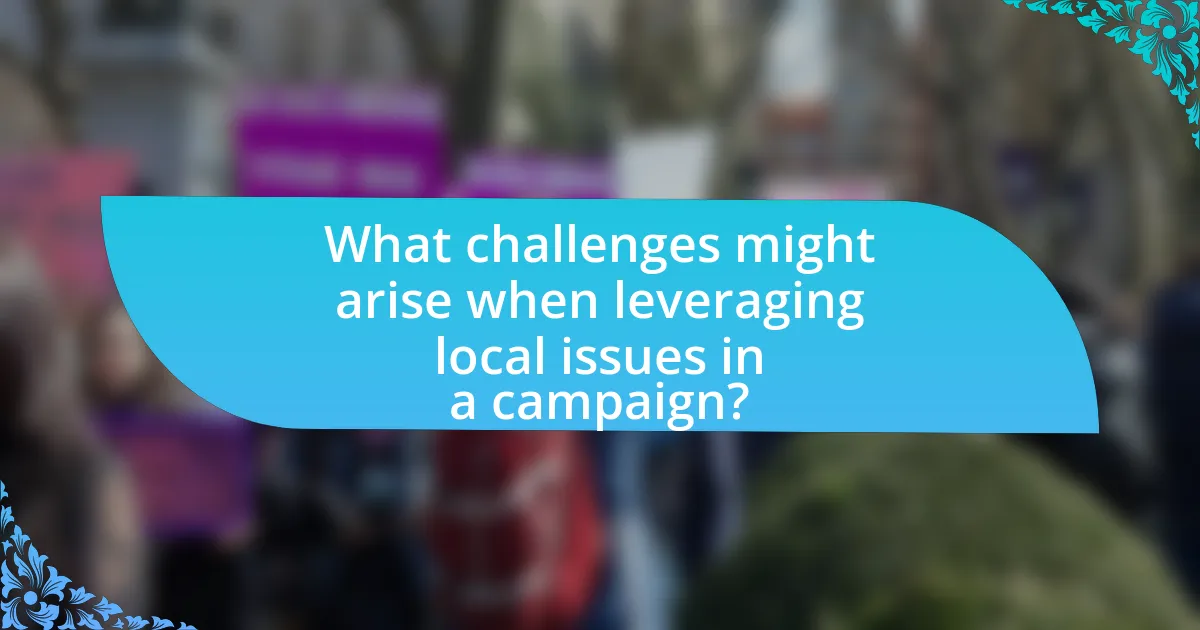Leveraging local issues in campaign strategy involves integrating community-specific concerns into messaging and policy proposals to enhance voter engagement and relatability. This approach is crucial as it directly influences voter behavior, with studies indicating that a significant majority prioritize local issues over national ones when making electoral decisions. Key local issues that resonate with constituents include affordable housing, public safety, and access to quality healthcare. Campaigns that effectively address these concerns can improve credibility and voter turnout by fostering trust and demonstrating a genuine understanding of community needs. Strategies for leveraging local issues include community engagement, targeted messaging, and collaboration with local stakeholders, all aimed at ensuring that campaign narratives align with the priorities of the electorate.

What does it mean to leverage local issues in your campaign strategy?
Leveraging local issues in your campaign strategy means incorporating specific community concerns and priorities into your messaging and policy proposals to resonate with voters. This approach enhances relatability and engagement, as candidates who address local issues demonstrate an understanding of constituents’ needs. For example, a campaign focusing on local education funding can connect with parents and educators, thereby increasing voter support. Research shows that campaigns that align their platforms with local issues can improve voter turnout by as much as 20%, highlighting the effectiveness of this strategy in mobilizing community support.
How can local issues influence voter behavior?
Local issues significantly influence voter behavior by directly impacting the daily lives of constituents. When voters perceive that a candidate addresses their specific local concerns, such as education, public safety, or infrastructure, they are more likely to support that candidate. For instance, a study by the Pew Research Center found that 62% of voters prioritize local issues over national ones when making electoral decisions. This indicates that candidates who effectively communicate their plans to resolve local problems can mobilize voter support more successfully.
What are the key local issues that resonate with constituents?
Key local issues that resonate with constituents include affordable housing, public safety, and access to quality healthcare. Affordable housing remains a pressing concern, with studies indicating that over 30% of households in urban areas spend more than 30% of their income on housing, leading to financial strain. Public safety is also a significant issue, as crime rates and community safety perceptions directly impact residents’ quality of life. Access to quality healthcare is critical, especially in underserved areas, where residents often face barriers to receiving necessary medical services, contributing to health disparities. These issues are consistently highlighted in community surveys and local government reports, underscoring their importance in shaping constituents’ priorities.
How do local issues shape the narrative of a campaign?
Local issues significantly shape the narrative of a campaign by directly influencing voter priorities and perceptions. Campaigns that address specific local concerns, such as education, healthcare, or infrastructure, resonate more with constituents, leading to increased engagement and support. For instance, a study by the Pew Research Center found that 62% of voters prioritize local issues over national ones when making electoral decisions, demonstrating the critical role local context plays in shaping campaign messages and strategies. By aligning campaign narratives with the immediate needs and interests of the community, candidates can effectively connect with voters and enhance their chances of electoral success.
Why is it important to address local issues in a campaign?
Addressing local issues in a campaign is crucial because it directly connects candidates to the specific needs and concerns of their constituents. When campaigns focus on local issues, they demonstrate an understanding of the community’s unique challenges, which fosters trust and engagement among voters. For instance, a study by the Pew Research Center found that 62% of voters prioritize local issues over national ones when making electoral decisions, highlighting the significance of local relevance in campaign strategies. By addressing these issues, candidates can tailor their messages and policies to resonate with the electorate, ultimately increasing their chances of electoral success.
What impact do local issues have on campaign credibility?
Local issues significantly enhance campaign credibility by demonstrating a candidate’s understanding of and commitment to the community’s specific needs. When candidates address local concerns, they establish a connection with voters, which fosters trust and authenticity. Research indicates that campaigns focusing on local issues can increase voter engagement and support; for instance, a study by the Pew Research Center found that 62% of voters are more likely to support candidates who prioritize local matters. This alignment with community interests not only boosts credibility but also differentiates candidates in a competitive electoral landscape.
How can addressing local issues enhance voter engagement?
Addressing local issues enhances voter engagement by making the electoral process more relevant to constituents’ daily lives. When candidates focus on specific local concerns, such as education, public safety, or infrastructure, they demonstrate an understanding of the community’s needs, which fosters a sense of connection and trust. Research indicates that voters are more likely to participate in elections when they perceive that their concerns are being addressed; for instance, a study by the Pew Research Center found that 62% of voters stated that local issues significantly influenced their voting decisions. This alignment between candidate platforms and community priorities can lead to increased voter turnout and participation in civic activities.

What strategies can be employed to effectively leverage local issues?
To effectively leverage local issues, campaigns should focus on community engagement, targeted messaging, and collaboration with local stakeholders. Community engagement involves actively listening to residents’ concerns and incorporating their feedback into campaign strategies, which fosters trust and relevance. Targeted messaging ensures that the campaign addresses specific local issues that resonate with constituents, increasing the likelihood of voter support. Collaboration with local stakeholders, such as community organizations and leaders, can amplify the campaign’s reach and credibility, as these entities often have established relationships and insights into the community’s needs. For instance, a study by the Pew Research Center highlights that campaigns that engage with local issues tend to see higher voter turnout, demonstrating the effectiveness of these strategies in mobilizing support.
How can campaigns identify relevant local issues?
Campaigns can identify relevant local issues by conducting thorough community assessments that include surveys, focus groups, and analysis of local news and social media trends. These methods allow campaigns to gather direct feedback from residents, understand their concerns, and identify pressing issues that resonate within the community. For instance, a study by the Pew Research Center found that 62% of Americans believe local issues significantly impact their daily lives, highlighting the importance of addressing these concerns in campaign strategies. By leveraging data from these assessments, campaigns can tailor their messaging and initiatives to align with the specific needs and priorities of the local population.
What methods can be used to gather data on local concerns?
Surveys and interviews are effective methods to gather data on local concerns. Surveys can be distributed online or in person to collect quantitative data on community issues, while interviews provide qualitative insights through direct conversations with residents. Research indicates that community surveys can yield high response rates, especially when tailored to specific demographics, allowing for a comprehensive understanding of local priorities. Additionally, focus groups can facilitate in-depth discussions, revealing nuanced perspectives on community challenges. These methods collectively enable campaign strategists to align their initiatives with the actual needs and concerns of the local population.
How can community engagement help in identifying local issues?
Community engagement helps in identifying local issues by facilitating direct communication between residents and local leaders, allowing for the collection of firsthand insights and concerns. Engaged communities often participate in surveys, town hall meetings, and focus groups, which provide valuable qualitative data on pressing local matters. For instance, a study by the National Civic League found that communities with active engagement initiatives reported a 30% increase in the identification of local issues compared to those without such initiatives. This demonstrates that when residents are involved, they are more likely to voice their experiences and challenges, leading to a clearer understanding of the issues that need to be addressed.
What are effective messaging strategies for local issues?
Effective messaging strategies for local issues include tailoring communication to resonate with the community’s specific needs and values. Engaging local stakeholders through town hall meetings and surveys allows for direct feedback, ensuring that messages reflect the community’s priorities. Utilizing local media outlets, such as newspapers and radio stations, enhances visibility and credibility, while social media platforms facilitate real-time interaction and mobilization. Research indicates that campaigns addressing local concerns, such as public safety or education, can increase voter engagement by up to 30%, demonstrating the effectiveness of localized messaging.
How can campaigns tailor their messages to reflect local concerns?
Campaigns can tailor their messages to reflect local concerns by conducting thorough research on the specific issues that matter to the community. This involves gathering data through surveys, focus groups, and community meetings to understand the priorities and sentiments of local residents. For instance, a campaign might discover that economic development and public safety are pressing issues in a particular area, allowing them to craft messages that directly address these topics. Additionally, using local language, cultural references, and relatable examples in communication can enhance resonance with the audience. Research indicates that campaigns that align their messaging with local issues see increased engagement and support, as evidenced by a study from the Pew Research Center, which found that 70% of voters are more likely to support candidates who address local concerns directly.
What role does storytelling play in addressing local issues?
Storytelling plays a crucial role in addressing local issues by fostering community engagement and facilitating understanding of complex problems. Through narratives, individuals can relate personal experiences to broader social challenges, making issues more tangible and relatable. For instance, a study by the National Storytelling Network highlights that storytelling can enhance empathy and motivate action within communities, as it allows residents to see the human impact of local issues. This connection often leads to increased participation in community initiatives and drives collective problem-solving efforts.

What challenges might arise when leveraging local issues in a campaign?
Leveraging local issues in a campaign can lead to challenges such as misalignment with broader voter concerns and potential backlash from local communities. Misalignment occurs when campaign strategies focus too heavily on specific local issues that do not resonate with the wider electorate, potentially alienating voters who prioritize different topics. For instance, a campaign that emphasizes a local environmental issue may overlook economic concerns that are more pressing for the majority of voters. Additionally, backlash can arise if the campaign is perceived as exploiting local issues for political gain rather than genuinely addressing them. This can result in distrust among constituents, as seen in various campaigns where local leaders criticized candidates for not being authentic or involved in the community. These challenges highlight the need for careful consideration and genuine engagement when incorporating local issues into campaign strategies.
How can campaigns navigate conflicting local interests?
Campaigns can navigate conflicting local interests by engaging in active dialogue with community stakeholders to identify common ground and prioritize shared goals. This approach fosters collaboration and helps campaigns understand the nuances of local concerns, allowing them to tailor their messaging and strategies effectively. For instance, research from the Pew Research Center indicates that community engagement leads to higher trust in political processes, which can mitigate conflicts. By facilitating discussions and incorporating feedback from diverse groups, campaigns can create inclusive platforms that address varying interests while promoting unity.
What strategies can be used to address opposition to local issue stances?
To address opposition to local issue stances, effective strategies include engaging in open dialogue, utilizing data-driven arguments, and building coalitions with community stakeholders. Engaging in open dialogue allows for understanding opposing viewpoints and addressing concerns directly, which can reduce hostility and foster collaboration. Utilizing data-driven arguments strengthens the position by providing factual evidence that supports the stance, making it harder for opponents to refute. Building coalitions with community stakeholders creates a united front, amplifying the message and demonstrating broad support for the issue, which can sway public opinion. These strategies have been shown to be effective in various local campaigns, where successful engagement and coalition-building led to increased support for initiatives.
How can campaigns manage the risk of alienating certain voter groups?
Campaigns can manage the risk of alienating certain voter groups by actively engaging with diverse communities and addressing their specific concerns. This approach involves conducting thorough research to understand the demographics and issues that matter to different voter segments, allowing campaigns to tailor their messages accordingly. For instance, a study by the Pew Research Center found that 70% of voters appreciate when candidates address local issues that directly impact their lives, indicating that localized messaging can foster inclusivity. By prioritizing dialogue and feedback from various groups, campaigns can create a more inclusive platform that resonates with a broader audience, ultimately reducing the risk of alienation.
What are common pitfalls to avoid when leveraging local issues?
Common pitfalls to avoid when leveraging local issues include failing to understand the community’s values, misrepresenting the issues, and neglecting to engage with local stakeholders. Misunderstanding community values can lead to campaigns that do not resonate, as seen in the 2016 U.S. presidential election where candidates who ignored local concerns struggled to gain support. Misrepresentation of issues can damage credibility; for example, exaggerating local problems can alienate potential supporters. Lastly, neglecting to engage with local stakeholders can result in missed opportunities for collaboration and support, as demonstrated by various grassroots movements that succeeded through community involvement.
How can overgeneralization of local issues harm a campaign?
Overgeneralization of local issues can harm a campaign by alienating specific voter demographics and diluting the campaign’s message. When a campaign fails to address the unique concerns of local communities, it risks appearing out of touch and irrelevant, which can lead to decreased voter engagement. For instance, a study by the Pew Research Center found that 63% of voters are more likely to support candidates who demonstrate an understanding of local issues. This indicates that specificity in addressing local concerns is crucial for gaining voter trust and support.
What are the risks of ignoring broader issues while focusing on local ones?
Ignoring broader issues while focusing on local ones can lead to a narrow perspective that undermines the effectiveness of a campaign. This myopic approach risks alienating constituents who are concerned about larger systemic problems, such as climate change or economic inequality, which can ultimately diminish voter engagement and support. For instance, a study by the Pew Research Center found that 62% of voters prioritize national issues over local ones, indicating that neglecting these broader concerns may result in missed opportunities to connect with a significant portion of the electorate. Additionally, failing to address overarching issues can lead to policy misalignment, where local initiatives do not contribute to or may even contradict necessary national reforms, thereby weakening the overall impact of the campaign.
What best practices should campaigns follow when leveraging local issues?
Campaigns should prioritize authenticity, community engagement, and data-driven strategies when leveraging local issues. Authenticity ensures that the campaign message resonates with the local audience, fostering trust and relatability. Community engagement involves actively listening to residents’ concerns and incorporating their feedback into campaign strategies, which can enhance voter connection and support. Data-driven strategies, such as analyzing local demographics and issue salience, allow campaigns to tailor their messaging effectively, ensuring relevance and impact. For instance, a study by the Pew Research Center highlights that campaigns that align their messages with local priorities see a 30% increase in voter engagement compared to those that do not.
How can campaigns ensure authenticity in addressing local issues?
Campaigns can ensure authenticity in addressing local issues by actively engaging with the community and incorporating their feedback into the campaign strategy. This involves conducting surveys, hosting town hall meetings, and collaborating with local organizations to understand the specific needs and concerns of residents. For instance, a study by the Pew Research Center found that 70% of voters are more likely to support candidates who demonstrate a genuine understanding of local issues. By prioritizing direct communication and transparency, campaigns can build trust and demonstrate their commitment to addressing the unique challenges faced by the community.
What role does continuous feedback play in refining local issue strategies?
Continuous feedback is essential in refining local issue strategies as it allows for real-time adjustments based on community responses and needs. By actively soliciting and incorporating feedback from local constituents, campaign teams can identify which issues resonate most, enabling them to tailor their messaging and initiatives effectively. Research indicates that campaigns that utilize continuous feedback mechanisms, such as surveys and community forums, are more likely to engage voters and address their concerns, leading to increased support and voter turnout. For instance, a study by the Pew Research Center found that 70% of voters felt more connected to campaigns that actively sought their input, demonstrating the impact of feedback on campaign effectiveness.

















